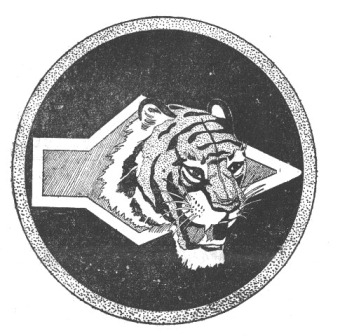

Vol. II, No. 46 BENGAL AIR DEPOT November 10th, 1945
NEW THEATER CHIEF INSPECTS DEPOT
Col. Glenn C. Thompson, Depot CO, recently was presented with honorary Chinese Air Force wings by Maj. Gen. Wei Cheng Lin of the Chinese Air Force. The presentation was made at the British and American Club in Calcutta.It was awarded in recognition of distinguished service and as a mark of deep appreciation for valuable cooperation with the Chinese Air Force. Eighteen other officers of the IB command were also presented wings at the ceremony, some in absentee.Among them were Maj. Gen. T. J. Hanley, Jr. and Brig. Gen. Frank D. Hackett, former BAD CG now in the States. PROMOTION OFFICER REASSURES ALL Many parents of servicemen, according to Lt. B. K. Hutchinson, Depot Savings Promotion Officer, have written to the government to tell about a gyp artist who offers their sons 4% interest on their money. The suspicious character turns out to be Uncle Sam, but his 4% Soldiers Deposits system is no clip scheme. "I don't believe it," wrote one worried mother, "I think it's something concocted by an officer for his personal gain." A Texan oil executive suggested that when civilian banks were happy to be able to squeeze out 1½% interest rates, the Army system sounded like a get-rich-quick scheme. The Army, says Lt. Hutchinson, hastens to assure the folks back home that the savings system is on the up and up, Soldiers Deposits are also on the up and up, reaching close to two hundred millions of dollars - more than 2½ times the total of a year ago. |
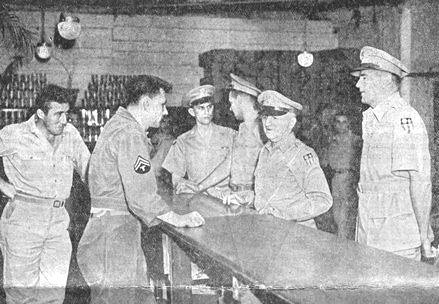 General Terry inside the Depot PX where he looked into the quality and quantity of supplies available for the personnel stationed here.Left to right: S/Sgt. Louis Scott, PX manager; T/5 Charles Trzcinka, clerk; Brigadier General Thomas B. McDonald, Commanding General AAF-IBT; Brigadier General William O. Reader, Theater Supply Chief; General Terry; and Colonel Glenn C. Thompson. General Terry inside the Depot PX where he looked into the quality and quantity of supplies available for the personnel stationed here.Left to right: S/Sgt. Louis Scott, PX manager; T/5 Charles Trzcinka, clerk; Brigadier General Thomas B. McDonald, Commanding General AAF-IBT; Brigadier General William O. Reader, Theater Supply Chief; General Terry; and Colonel Glenn C. Thompson. |
MAJOR GENERAL TERRY
FAVORABLY IMPRESSED
BY ACTIVITIES HERE
"I am well satisfied with the Depot," were the parting words of Major General Thomas A. Terry, recently appointed Commanding General, USF, IBT, after a comprehensive hour and a half tour of Bengal Air Depot this past Friday afternoon.
General Terry, making his first visit here, inspected most of the area and installations of the huge sprawling depot which has made Army Air Force history in maintaining and overhauling equipment and keeping supplies rolling to Air Force units and depots throughout the India-Burma and China Theaters.He was accompanied by Colonel Glenn C. Thompson, Commanding Officer of the Depot, who described to him the various activities.Also with the General were Brigadier General William O. Reader, India-Burma Theater G-4, and Brigadier General Thomas B. McDonald, Commanding General, AAF-IBT.
General Terry was particularly intested in the comforts and morale of the Depot personnel.He stressed a number of times the importance of the Depot insuring that there be no relaxation in the standards of the enlisted men's living, messes, PX, entertainment and recreational standards.
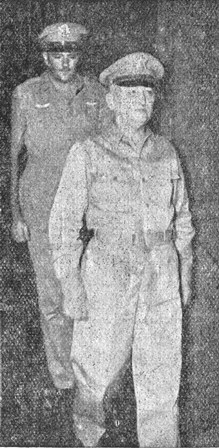 General Terry and Colonel Thompson leaving one of the installations on the Depot. General Terry and Colonel Thompson leaving one of the installations on the Depot. |
At one of his stops, that at the Depot PX, the General questioned S/Sgt. Louis Scott, PX manager, as well as clerk T/5 Charles Trzcinka of the 923rd Signal Co. regarding the types, quality and quantity of PX supplies available.He also stopped Cpl. Lester Blackwell of the 1212th MPs to obtain a GI's impression of the merchandise being sold and services offered.
General Terry believed most of the men realize there still remains a job which must be finished.For that purpose some men will have to remain here.But he desires that the men who do stay in this theater under his command enjoy the same excellent grade of movies, shows, PX items, etc., as those who had been in the theater and have returned stateside.
After lunch at the Officer's Mess, General Terry proceeded on his exhaustive tour of the Depot.The small convoy, lead by an MP jeep, first visited the airfield and ATC and ASC installations at Brrackpore, then returned to Kinnison.The next lap took in the Air Corps and Signal Supply hangars and then the huge warehouses at Titaghur.Passing headquarters and later down Broadway, after first viewing the Air Corps Supply areas, the General took in Rajah's Rest, the Depot Chapel and a consolidated mess.The last stretch was through Compound No. 3 to the jetty from which General Terry departed for Hastings.
Although the men had not been previously informed about General Terry's coming, military courtesy was noticeable throughout the Depot area, Kinnison and Barrackpore.Colonel Thompson can well be proud of the men who, although busy at their tasks, yet recalled army courtesy on spotting the staff cars and their occupants.
SECOND GENERATION FOR RC FIELD DIRECTOR
"It's a boy," is no longer news to many of us at the Depot but when it is a grandson, then it is time to perk our ears and hasten the congratulations.
No one else than Roy C. Hutchinson, Depot ARC Field Director becames the proud grandpop.Instead of cigars, he was busy passing out loans to all who needed them.And your Tiger Rag came in for a ten rupees donation too.What we need is more grandchildren.
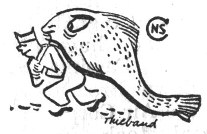 THE BIGGEST FISH, YET
THE BIGGEST FISH, YET "The biggest fish I ever caught," said Pfc. James F. Hollis of the 903rd Signal Co., seen fishing in Headquarter's Lake, "was a monster I pulled out of the Hooghly River, weighing three hundred pounds soaking wet.
"Yes," Hollis continued, "that was a fish.And you know what I used as bait to land that baby?Carewe's! Yessir. I fed a bottle of Carewe's to Angelo (T/5 Angelo Natale of the 903rd) who was fishing with me.He fell into the river and the fish swallowed him whole, fishline, carewe's and all.Then - quick as a flash - I grabbed Angelo's line and hauled the whole mess ashore.
"Yessir," said Hollis."That was some fish."And some tale!
DFCs AND OAK LEAF CLUSTERS AWARDED
Four members of the 1st Air Commando Group, currently attached to the 28th Hq. Squadron, were on the receiving end of well earned decorations from Colonel Glenn C. Thompson, Depot CO, all within the period of one week.
One of the chief recipients was S/Sgt. Charles H. Weed, an aerial engineer who hails from Hartford, Alabama.He received both the Distinguished Flying Cross and an Oak Leaf Cluster to his Air Medal yesterday at Headquarters.The DFC was for 50 missions in Burma from March 25th to April 26th of this year during which the C-64 he was flying disregarded all hazards to pour harassing fire on enemy troop concentrations and installations.
The Oak Leaf Cluster was for the period from February 3rd to March 24th, 1945 for extraordinary achievement during 100 hours of aerial flight during which Weed's plane was a vulnerable target to enemy fighter aircraft patrols.
At the same ceremony, Colonel Thompson handed to Capt. Howard M. Georgi of San Francisco, Calif., the DFC for action with the Fifth Liaison Squadron, AAF, during which time he was continuously exposed to enemy fire and ably assisted in keeping up supplies, artillery adjustments and reconnaissance.
The previous Friday, during impressive retreat cermonies, Maj. James R. Woods from Malone, NY received the DFC and two Oak Leaf Clusters to his Air Medal from the Depot Commander.The awards were for meritorious service while flying as a liaison pilot in the Burma campaign.
Immediately thereafter, Capt. Julius Goodman, also a liaison pilot who comes from Dallas, Texas, was awarded his third Oak Leaf Cluster to the Air Medal which was made by Col. Thompson in recognition of his services during the completion of more than 50 missions over Jap installations in Burma.
Services Held for Cpl. John R. Northall
Before an impressive group of friends, funeral services were conducted last Monday afternoon at 1500 for Cpl. John R. Northall of the 48th Depot Supply Squadron at the United States Military Cemetery at Barrackpore.
The ceremony, held on the burial grounds with a bright afternoon sun slanting silhouettes among the white crosses, was conducted by Chaplain William C. Hart.Members from Cpl. Northall's former company, the 1212th MPs, joined by men from his present unit, the 48th Supply Squadron, served as pallbearers.
A military band complemented the solemn service, a detachment of MPs from the Depot fired a volley, and the flag descended to half mast as "taps" was played.Then as his hundreds of friends stood with bowed heads, the flag was raised to the top of the pole where it waved and furled in tribute to a fine soldier.
Cpl. Northall arrived at the Depot in February, 1944.He joined the Army in July, 1943.He is survived by his wife, Mary, and his mother and father.Closely associated with this paper, Col. Northall was one of the staff at the Base Photo Laboratory.
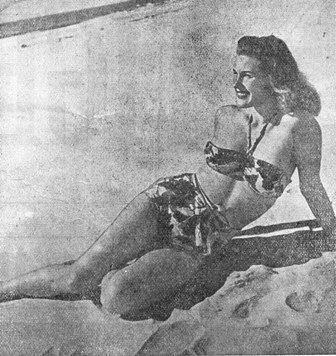 |
After 13 Months in India Jute Mill
(Ed's Note: The following "snow job" appeared in its entirety recently in the New York Times.Interspersing the article are a few pungent observations squeezed from our frayed crying towel for those military martyrs... the Wacs.)
CAMP SHANKS, N.Y. Oct. 22 - Three Wacs who spent thirteen months in a jute mill cantonment on the Hooghly River, eighteen miles from Calcutta, India, without leaving the isolated area where they were assigned, arrived here today preparatory to being mustered out at reception centers near their homes.
The headquarters, camouflaged so it still looked like an old jute mill despite the 300 Wacs and 2,000 soldiers stationed there, was equivalent to only one and one-half city blocks, the three veterans said.The only organized amusement facilities were a movie at the end of the pier, and the chance to go to Calcutta twice a week.But there were so many sacred cows, so many bumps along the way and such mobs in the city that in all the thirteen months some Wacs never made the eighteen-mile trip once, they said.
(Girls, girls... you're breaking our heart! No organized amusement with 2,000 GIs there?With mixed drinks available at the Snort Club?With everyone taking you to their dances?And those bumps in the road were only there to jar out some of that conceiled ego you developed because GIs in a pinch will pant at anything... Wacs included!)
Quarters were so close, Sergeant McKinney said, "It was only forty steps from my bed to my desk."(She hollers yet! Listen, sister, things used to be so crowded here that even the rats in the barracks were stoop-shouldered from moving around.)The 300 Wacs were quartered in one building screened off to separate their offices from the 300-bed dormitory they dubbed "largest single bedroom in the world."
Every five Wacs had a native Indian servant, an ayab, to make their beds and clean the dormitories.Additional native atmosphere was provided by servings of water buffalo steak, considered a delicacy by the natives."It tasted worse than the toughest roast beef I ever had in America," said Sergeant McKinney.(This gal is definitely nuts. Being a Wac she should know there's only three kinds of beef in the Army - win, place and show! Yet she got buffalo steak - the aristocrat!)
The dehydrated vegetables often remained wrinkled and shrivelled despite efforts to coax them to normal size, the Wacs reported.They had no milk after August 7, 1944, and none was on the boat that brought them home by way of the Suez Canal and the Mediterranean in twenty-one days.(No milk, eh? H-m-m!)
The homeward voyage completed a round-the-world trip started when they left New York over a year ago, went through the Panama Canal, to Australia, to arrive in India forty days later.
Although none of the three returnees married overseas, fifteen of the Wacs also stationed at the jute mill married servicemen there.(It serves all three of them right. We earnestly hope they get a civilian husband which is what they deserve.)
IN TRIBUTE TO A SOLDIER .... CPL. JOHN R. NORTHALL
This is being written, John, in tribute for the many warm memories you left here with your friends when the Commanding Officer "upstairs" assigned you to his great army we all must join someday.
Nothing we can phrase here can correctly convey the deep personal loss and sense of inexplicable tragedy we experienced upon knowing you had been chosen for admittance into those heavenly ranks mustered for duty into the infinite reaches of the sky.
For us here, John, it's difficult to understand why you were selected to go at the present time.Our fettered human minds cannot stretch across the unknown transitions of time for answers on actions not meant for our understanding.Hampered by our own narrow and unclairvoyant mental boundaries which prohibit trespasses to supernatural borders, we are confused and can only feel, numbly, the shocking surprise that your passing left us.Along with this we feel keen compassion for your wife and parents.
In our minds, John, coupled with real regret, is the terribly tragic irony that you were called at such a seemingly inappropriate time.For you survived, unscathed, the long perilous war years.The dim twilight of this period was lifting.Yet with the future brightly aureoling the doorway of your heart, a tiny little wind appeared from nowhere and irrevocably closed the door.This, somehow, to us is the incomprehensible great tragedy.
Like the countless thousands who too gave the full measure and preceded you, John, you will not be forgotten or ignored in the years to come.
In humble farewell we sincerely salute you, John, for your friendship; for your good-natured photographic diligence which in innumberable instances brought complimentary pictures to brighten and index this newspaper's pages; and for the high enthusiasm you always displayed - not to just get the job done, but to get the job done right.
The Bengal Air Depot has lost a fine soldier.We have lost a very good friend. The Tiger Rag Staff
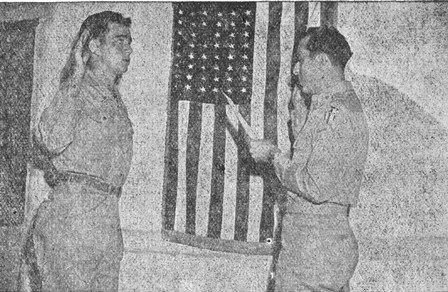 The 50th man to be sworn in the regular army at Benagl Depot is Pfc. James L. Rosser, 48th Dep. Rep.He is from Macon, Mississippi and has been in the army 20 months, seven of which have been spent overseas.He will go to the ETO as an aircraft mechanic after his return to the U.S. for furlough. The 50th man to be sworn in the regular army at Benagl Depot is Pfc. James L. Rosser, 48th Dep. Rep.He is from Macon, Mississippi and has been in the army 20 months, seven of which have been spent overseas.He will go to the ETO as an aircraft mechanic after his return to the U.S. for furlough. |
A Year Ago
The Depot basketball tournament started with the 47th Depot Supply the red hot favorite...Rajah's Reast was getting over its first anniversary celebration planned by names long departed and almost forgotten, such as Mildred Stutzenberger, Doris Ewing and Virginia Shiner...That short-lived Dramatic Club activated...200 Depot GIs were the guests of a huge party given in their behalf at Calcutta at the fashionable British and American Officers Club...Post Theater was giving five rupee PX purchase prizes to the early birds while "Paris After Dark" and "Lady, Take A Chance" emoted on the screen...The columns were congratulating or consoling their baseball teams and pepping them for the next.
FAREWELL TO A STAR PERFORMER
By an Atlanta Cracker
I have just recently been assigned to Bengal Air Depot and last week came in contact with a very fine friend whom I haven't seen since 1942.
I saw in this week's edition of Tiger Rag a request for items of interest so I would like to relate this information about this very modest fellow whom I don't believe you people at Bengal Air Depot know too much about as he too is rather new here.
He is 1st Sgt. Dan Magner of the 316th Depot Supply Squadron... one of New England's great atheletes.
Last week I ventured out to the ball field where Mag was jogging around, catching fly balls and taking a few cuts for old time's sake.A few days prior, he received a letter from William Bramham, President of the Minor Leagues, asking if he desired to be placed back on the active player list for 1946.Back in 1940, Mag requested and received an outright release and was put on an inactive status following a severe shoulder injury which forced him to retire after playing 67 games with New orleans of the Southern Association.
At the time of his mishap, Mag was batting a healthy .337 and had smashed out 14 home runs over the distant barriers.The New York Giants had the inside track on his contract and were planning to introduce another outstanding player to New York fans.The injury forced him to give up the idea of ever throwing with the old left arm again.
Since that time, with constant practice, he has overcome this handicap and now throws righthanded in a very favorable manner.He can throw for distance but not too accurate.
I have watched this big fellow perform every time New Orleans played in Atlanta and I know that I speak for thousands of baseball fans there and all cities of the Southern Association in saying we hope you return to baseball, Mag, and continue to perform as you had before your mishap.
Mag is a 60 pointer and should be heading back soon.He tells me he has a very fine position with a large insurance company in Boston and believes he will remain with this company and play baseball and ice hockey around New England.
Irregardless of his decision, I want to wish him well and know all you fellows who have made his acquaintance join me in saying: "Farewell and Good Luck to a Great Guy."
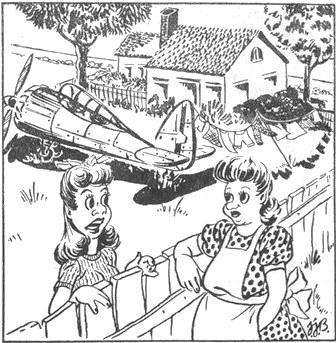 "... and just when he was about to send the wings, someone had to invent a thingomojig called an Inspectoscope." "... and just when he was about to send the wings, someone had to invent a thingomojig called an Inspectoscope." |
FOR THOSE WHO TAKE
By GAB
Word comes from one of the more glamorous army publications the not unknown news that the Army Postal Authorities have perfected a device to thwart the potential smugglers of GI equipment and contraband into the U.S. from overseas.
The insidious invention is known as the Inspectoscope and operates on the X-ray principle with a fluoroscope screen added to speed up the operation.
Anything made of bone, metal or of high carbon content in the packages being examined is visible on the viewing screen.If the shape of the visible items are identifyable as fire arms, hand grenades, GI equipment or items that aren't legally mailable the box is opened and the illegal items confiscated.
Contraband articles are turned over to the Customs Office and if those items are proven to be stolen government property the guy who sent it lands in the guard house.
Let us dispense with formality and get down to other aspects of the situation.
In the first place, our souvenir collectors must be a bunch of potential Al Capones or Dillingers or gentlemen of the ilk.Why does a guy want a box of live hand grenades?To drape across the mantle, maybe?or could be, the favorite nephew would like to chaw on 'em in his crib.Personally, we don't think the little tyke has enough strength to pull the pin.
On the other hand, the senders of automatic rifles, tommy guns, and light field pieces might well be itinerant hunters of wild game who had bad luck in bagging a string on their last civilian hunt.Nothing like a .37 millimeter shell to bring down a deer!
We prefer to think of the firearms shippers as men of good intention who are just going to start a museum or something.It might even be possible that a few covet a secret dream that someday, far in the future, they'll march down the main drag in Mauchchunk, Pa. in the veteran's parade with an old fashioned weapon called a tommy gun over their shoulder.
The newspaper account of the parade might even mention their name; "The fiftieth anniversary of the Great War was celebrated today by a parade of the only living veternas.Among the aged marchers was one Joe Q. Schmerecase the only veteran to carry a firearm.He proudly displayed an archaic weapon known as a 'Thomas Gun' or 'Tommy Gun' that he 'borrowed' while a member of the armed forces."
The article won't mention that Joe also shipped home some live land mines and a few flame throwers 'way back when' and got caught and spent a good while in the guard house.
GI clothing will be nice for postwar wear, it seems.We have spent over three years in khaki and O D burlap and shudder at the thought of wearing things that even resemble our GI 'robes of malice.'But the Inspectoscope picks up countless shirts, pants, blouses, field jackets and long johns that clothing savers have shipped home.We suppose it's that guy in the parade again.
But no matter why these things are being shipped home, the shipper is going to get in trouble.The Inspectoscope is fool proof and very impartial.It doesn't know that Aunt Minnie asked for a Jap rifle and that Aunt Minnie wouldn't hurt a flea let alone shoot someone.But if the rifle is termed contraband, poor nephew winds up in the guard house.
If you just have to send some of that stuff home, first find a way to beat the inspectoscope.They claim, so far, nobody has.
Moreover suppose you did get some live explosives past the censors.Unsuspecting civilians just don't know how to handle those things.Even written instructions are no good.
One story in particular sticks in our mind about the GI who shipped home a collection in which reposed two hand grenades.he told the folks in a letter how the 'infernal machines' worked and to be sure and not pull the pin unless they were prepared to leave the vicinity.
Well, as all stories go, the folks decided to make use of the handy little demolishers.Being simple country folk used to simple country ways, they had possessed for a number of years a little house adjacent to the main buildings that served as a communing place for those who felt need of rapport with nature.
Through the years this little building had deteriorated till finally the head of the house decided to remove it in favor of a new edifice.At the precise time of his decision GI Joe's package arrived with the aforementioned articles of destruction.GI Joe's old man could hardly contain himself when he hit upon the idea to satisfy his curiousity about the hand grenades and at the same time rid the household of it's unsightly back house.
In his eagerness, since this story has to be plausible, he forgot that Grandpa had annexed the out-house as his personal study.
Grandpa's selection of the site for his rendezvous with thought "was incongruous but for himit solved several problems and suited his mood for peace and quiet.
But top get back to the head of the house.Taking one of the grenades he meticulously pulled the pin, counted three and tossed the pineapple in the direction of the Temple of the Bowel.
From the smoke and falling timbers, Grandpa staggered with his galluses trailing and an amazed expression on his face.The look of amazement slowly changed to one of all-knowing and secret satisfaction.Turning to Pop he said: "Allus knew them things was par'ful, but ah kind of outdid m'self that time."
So you can see how innocent little gifts like hand grenades or bombs can upset folks at home something awful.And give wrong impressions!!
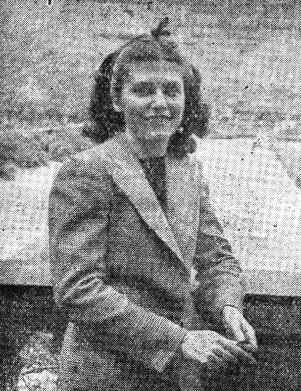 Last week we pictured an average Pacific coast girl and this week we've selected one from the Atlantic side to show what's waiting for us lads when we finally get that white paper. Last week we pictured an average Pacific coast girl and this week we've selected one from the Atlantic side to show what's waiting for us lads when we finally get that white paper.No acclaimed pin-up these, no renowned glamour girls -yet, deep down, who among us would really want to trade our Marys and Annies and Janes for the publicized and exotic hot-house beauties clamoring languorously for our attention. |
PX Explains Certain Popular Brand Shortages
The reason the PX is out of your favorite brand of cigarettes occasionally is that in the monthly quota alloted, an over-abundance of certain brands are delivered.This necessarily means that other brands will be cut in quantity according to the PX.
When cigarettes, or for that matter anything, are ordered from the main warehouse only the total number of cases can be specified.Out of that total, the warehouse proportions the brands so that the more popular varieties form the bulk of the order.
Sometimes a shortage of one kind of brand or another makes it necessary to supplement or fill in the order with another brand.
Capt. Charles B. Hemenway, Depot PX Officer, is able to solve the problem sometimes by trading some of the over abundant brands to other PXs in the vicinity.Since the standard brands are almost universally popular in the same ratio, and Luckies sell out first, it is well nigh impossible at times to effect a trade.
You Can Keep Dog Tags When They Let You Out
Washington (CNS) - Here's what you're entitled to keep when you are honorably discharged or placed on inactive duty, regardless of climate, season, or location:one barracks bag, one belt, one pair of shoes or boots, one garrison or service cap, one blouse, one mackinaw or overcoat if required for warmth, one raincoat or poncho, 2 shirts one of which may be wool if in soldier's possession, one pair of cotton trousers or breeches, one pair of OD trousers or breeches, appropriate insignia, all gloves, handkerchiefs, dog tags, ties, socks, toilet articles, towels and underwear.
Comparable clothing including the WAC utility bag and scarves are to be retained by EW upon separation.The yellow honorable discharge emblems are to be sewn on blouses, shirts and coats during the process of separation.
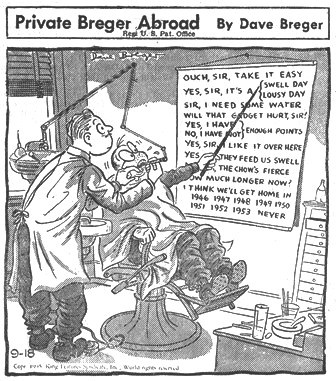 |
YEP, SLOW BUT SURE
From V-E Day to October 15th, a total of 2,135,000 troops have been returned from all theaters, as follows:1,716,000 from Europe and the Mediterranean,293,000 from the Pacific,31,000 from China-Burma-India and 95,000 from other non-Pacific theaters.
Army and Navy shipping cooperation will make it possible for troops to arrive at West Coast ports at the rate of 200,000 a month during the first four months of 1946, Maj. Gen. C. P. Gross, Army Chief of Transportation stated.
CHEER UP, PIPE SMOKERS
PX TO THE RESCUE
Pipe smokers will be interested to hear that an extensive effort is being made by the PX office to maintain an adequate supply of smoking tobacco.According to Capt. Charles B. Hemenway, Depot PX Officer, 90% of the pipe tobacco received has to be destroyed because of spoilage by mould.
Stocks of tobacco have to be shipped in large quantities, necessitating storage of the surplus till it can be used.Over a period of time, the cellophane covering loses it's efficacy and the decay producing phycomycetous fungi takes it's toll.
UNRATIONED BEER TO ORGANIZATIONS
The PX officer, Capt. Charles B. Hemenway, has figuratively speaking, 590 cases of mixed-up beer on his hands.Cases of beer that were exposed to the elements were re-packed by coolie labor and since the coolies can't read the labels, three or more brands were mixed.
The scrambled suds are sold unrationed to organizations at the rate of a maximum of 5 cans per man per organization.If you are going to throw a squadron beer bath, buck a letter to Capt. Hemenway and apply for your organization's share.
BEEHIVE BUZZES
We're offering a new tour at the Beehive this month.We have arranged to visit the Silver Baazar in the area just beyond the base.This is your chance to buy your best girl those bracelets she's been wanting.They have different styles and designs all out of pure silver.There are other pieces of silver jewelry so you have a wide selection.These tours are weekly so watch the schedule for the Beehive activities.
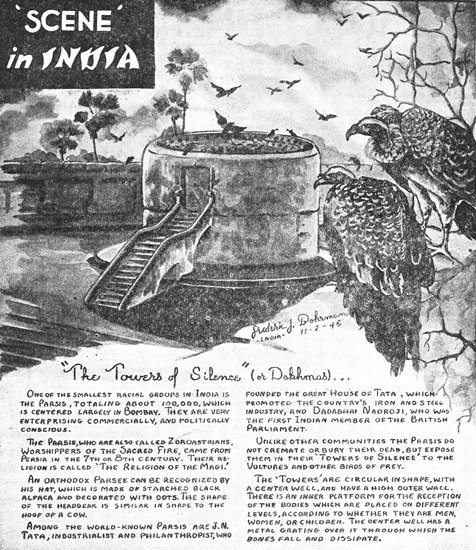 ENLARGE IMAGE |
Medals, Ribbons and More Medals
for Depot GIs
Here's another length of lettuce for all the GIs on the Depot, this time the World War II Victory Medal.
Pending publication in a War Department Circular, announcement has just been made that this new piece of fronting will be awarded to all members of the Armed Forces who served honorably on active duty at any time between 7 December 1941 and a date to be announced later.In case you lads don't know, all military personnel here are on active status.So want it or not, we'll just have to make up our minds to support the added burden.
The ribbon for the medal will really be something - a red center ribbon with narrow white borders flanked by narrow double rainbows placed close together.It's now in the process of being issued and looks a bit like the Victory Ribbon for the last war.
However, don't bother the supply sergeant tomorrow for one.There ain't any in the IBT.The Separation Centers - you know what they are, don't you - have priority in the supply of these ribbons.
When you do get yours, just wear it immediately after your campaign service ribbons for this war.
And in case you've forgotten, there's another medal due you.Well, most of you anyhow.It's that Medal For Service which Congress voted back in the summer of 1945.Its for all of us who have seen active service - don't forget the honorable part - during the period between December 7th, 1941 and "ending with the date of the termination of hostilities in the present war."It's still got to be made up, but you and you will be wearing it one of these days.
And if you're now ready for that sigh of relief... wait!!!Some of you men will have to wear that American Theater Service Ribbon, you know.That is, those of you who have served honorably on active duty within the continental limits of Uncle Sugarland for an accumulated period of one year.Commencing period on this is December 7, 1941.Closing date will be announced later.
That's all for now, fellows, but don't relax.You can't tell what'll be wished on you next.
YOUR ARMY DID THIS
Army Service Forces, which handles all disbursements for Army pay and war material procurement, has paid out $172,000,000,000 for these purposes since July 1, 1940 according to the report of Gen. Brehon B. Somervell to the War Department.In the report, covering the fiscal year of 1945, Somervell summed up war-long activities of the ASF and its personnel, listing the operations of seven technical services in the Forces and gas as 150 billion dollars the figure for fighting materiel.
Ordnance procurement alone amounted to 34 billion dollars, and "Ordnance and American Industry, working as a team, built 2,500,000 trucks, 50,000 self-propelled guns, 88,000 tanks, 133,000 other types of combat vehicles," the report said.
Chemical Warfare accomplishments came in for the following mention: "The principal reason the Axis powers did not uase poison gas against our troops in Europe and the Pacific probably was that they were afraid to.They knew that we were holding in adequate reserve stocks of gas more deadly than anything they themselves possessed."
The Transportation Corps moved 32,100,000 troops in the U.S. by train and 600,000 by bus in addition to handling 5,000,000 individual and small group reservations.56 million tons of supplies were shipped in 1945 as compared to 39 million the previous year.
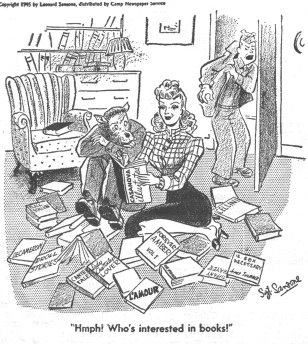 |
The Medical Corps, the report said, set a record in achieving a lower mortality rate than any other army in the history of the world, 4.3 percent of the wounded."Bold and successful use of sulfanamides and penicillin,: it was said, "reduced the fatality rate of meningitis from 38 percent in World War I to 3 percent;pneumonia from 24 to 0.7 percent;dysentery from 1.5 percent to only one recorded death."
Installations to house a military population of 5,300,000 were constructed by the Engineers.Their maintenance work involved 12,550 miles of sewers, slightly more than that mileage in water mains, railroads that would reach from Boston to San Francisco and then up the coast to Seattle, highways that would stretch from San francisco to New York and back ten times, 22,600 miles of electric lines and 2,660 miles of gas mains.
The Signal Corps, in large part responsible for the development of radar, handles a peak traffic capacity of 50,000,000 words over its communications system daily.A nione-word test message was sent completely around the world through four relay stations in three and a half minutes.The Corps installed and maintained point-to-point communication along some 100,000 miles of airways operated by the Air Transport Command.Its Army Pictorial Service produced more than 2,700 motion pictures used by the Army Ground Forces and distributed more than 302,000 prints of thos pictures, according to the report
The Corps of Military Police which in July 1941 numbered five officers and one civilian, today has 200,000 on its force.Since the beginning of the war, the MPs have apprehended about 25,000 AWOLs, investigated more than 52,000 criminal cases involving members of the Army and recovered stolen property valued at $2,000,000.They had the job of handling prisoners of war overseas, as well as 425,000 of them in the United States. (ANS).
 DON'T CRY FOR THE ARMY
DON'T CRY FOR THE ARMY There just aren't enough dumb-johns at West Point this season to make the brave old Army team the awe-inspiring bone-crusher it was a year ago.But don't let that fool you into betting any currency against the mule.
Last year lt. Col. Red Blaik, the head coach at Army, had a team full of holdover regulars plus another team full of plebes which combined to give Army the two best football teams in its history.This year most of the regulars have left - including Doug Kenna, Tom Lombardo, Max Minor, Dale Hall and Bobby Dodds who were five of the finest backs in the land - and Col. Blaik is going to miss them.
For his first string backfield this fall all Col. Blaik has left are Glenn Davis, who scored 20 touchdowns last fall;Doc Blanchard, an even finer back than Davis, plus Dick Walterhouse, who last year set an all-time record for conversions, and Shorty McWilliams, the plebe from Mississippi State who's supposed to combine all the talents of Red Grange and Jim Thorpe in a football suit.Add this to a line which includes huge DeWitt Coulter at center, and speedy Jim Poole at end and you can see what a tough spot Col. Blaik is in.
"We're woefully short on backs," says he, "and we just haven't got the depth we had a year ago."
What the colonel means, of course is that he hasn't got as many backs as Navy.He's pointing at the Navy game as the one which will make or break the season.Last year his guys won, 23-7, but Navy, now using the 'T' may turn the score around this time.
Earl Lawrence Still Winning Here
Earl Lawrence, who still claims to be a member of the 1953d Ordnance Co. pending his return stateside, took the measure of one of the best IBT fighters in Johnny Dean last Wednesday before one of the largest audiences at the Calcutta Football Club grounds.
Earl easily piled up a two round lead and had a knockdown to his credit at the outset.He dolled out plenty of punishment but Dean managed to weather the blows and land some hard rights himself.
Dean kept on trying to carry the fight to Lawrence but Earl was on the alert for the round-house hay-makers and with the exception of the third round managed to steer clear.
923d Wins Signal Table Tennis Round Robin
In the third and deciding ping pong match between the two Signal companies, the 923d overwhelmed the 893d last Wednesday night at Rajah's Rest by the score of five matches to two.
The outcome of the contest was decided before the start of the doubles matches as the 923d blasted to a four to one advantage in the singles encounters.Lewtas, No. 1 man for the 923d, set the pace with a decisive victory in two successive games over the formidable pepin, who on the previous evening had advanced to the finals of the weekly Rajah's Rest tournament.Al Morris made a brilliant comeback, after dropping the first game in the second match of the evening to trip Haire of the 893d and give the Tigers a 2-0 lead.
Art Goldberg, showing the form that has made him a mainstay of the 923d team, bagged the third win by beating Garret two games to one.After Massee had trounced Carson for the Tigers fourth victory, Specht of the 893d downed Hollerain to save them from a complete whitewash in the singles' matches.
The 923d continued their winning ways in the first doubles encounter as Zdazinsky teamed with Goldberg to trim Pepin and Haire.In the final match of the evening the 893d scored their second win as carson and Specht downed Morris and Massee.
BAB Baseball Team Drops Two
Our BAB Flyers baseball team played two games this past week on the Maidan diamond in Calcutta, going down to defeat in both games, and thereby dropping their average to an even .500 with two wins and two losses.
The first game played against an MP detachment from Calcutta, resulted in a win for the "cops" by the score 4-0.This was due largely to the pitching of big Bill Kuzaza, who mixed a fine curve with a blazing fast ball that had our boys handcuffed.He struck out fourteen men, and allowed only three hits.This was one less than his mates were able to get off the offerings of Flischel of the Flyers.
The second game was a thriller all the way with ateam from the base section Signal Corps.They nosed out the Flyers in 11 innings 8-7.Both pitchers were treated rather roughly with the hitters having a field day.The feature of the game was a smashing triple, with the bases loaded, delivered by Joe Bellock of the Flyers.
BAB Flyers Eliminated
You would stand in front of that steam roller, Granny - That's why I left you flat.Meaning that the Howrah Mulletts really rolled over the BAB Flyers basketball team last week to the tune of 57-31, thereby eliminating them from the Monsoon Square Garden tournament.
BAB Flyers Down Undefeated All Stars
Our basketball team bounced right back from the first game of the Monsoon Square Garden Invitational Tournament and breezed to a very impressive 53-36 win over the highly favored Tezgaon All Stars who before last night had a string of sixteen straight wins to their credit.
The Flyers displayed plenty of fight in the game.After being on the short end of a 16-4 count, midway in the first quarter, they came back to a 25-20 lead at the half, much to the enjoyment of BAB fans.There were no outstanding players on the Flyers squad, as every man demonstrated his ability as a team player.

The Tiger Rage is a weekly publication edited and written by and for the Enlisted Personnel and Officers of APO 492, Air Service Commandand is under the direction of the Commanding Officer, Colonel Glenn C. Thompson and the Public Relations Officer, Lt. Col. Edward D. Dixson. STAFF: EDITORS... Pfc. Eugene Bernald and Pfc. Johnnie Leonard; NEWS ... Cpl. George Bingham;ART... Sgt. Fred J. Bohrman;PHOTOGRAPHY... Cpl. "Tiny" Klein. Statements or policies reflected through the columns of this publication under no circumstances are to be considered those of the United States Army. Articles submitted by Officers and Enlisted Men represent personal opinions only.

NOVEMBER 10, 1945
Copyright © 2015 Carl Warren Weidenburner
SEE THE ORIGINAL
ABOUT TIGER RAG E-MAIL YOUR COMMENTS MORE TIGER RAG
TOP OF PAGE CLOSE THIS WINDOW